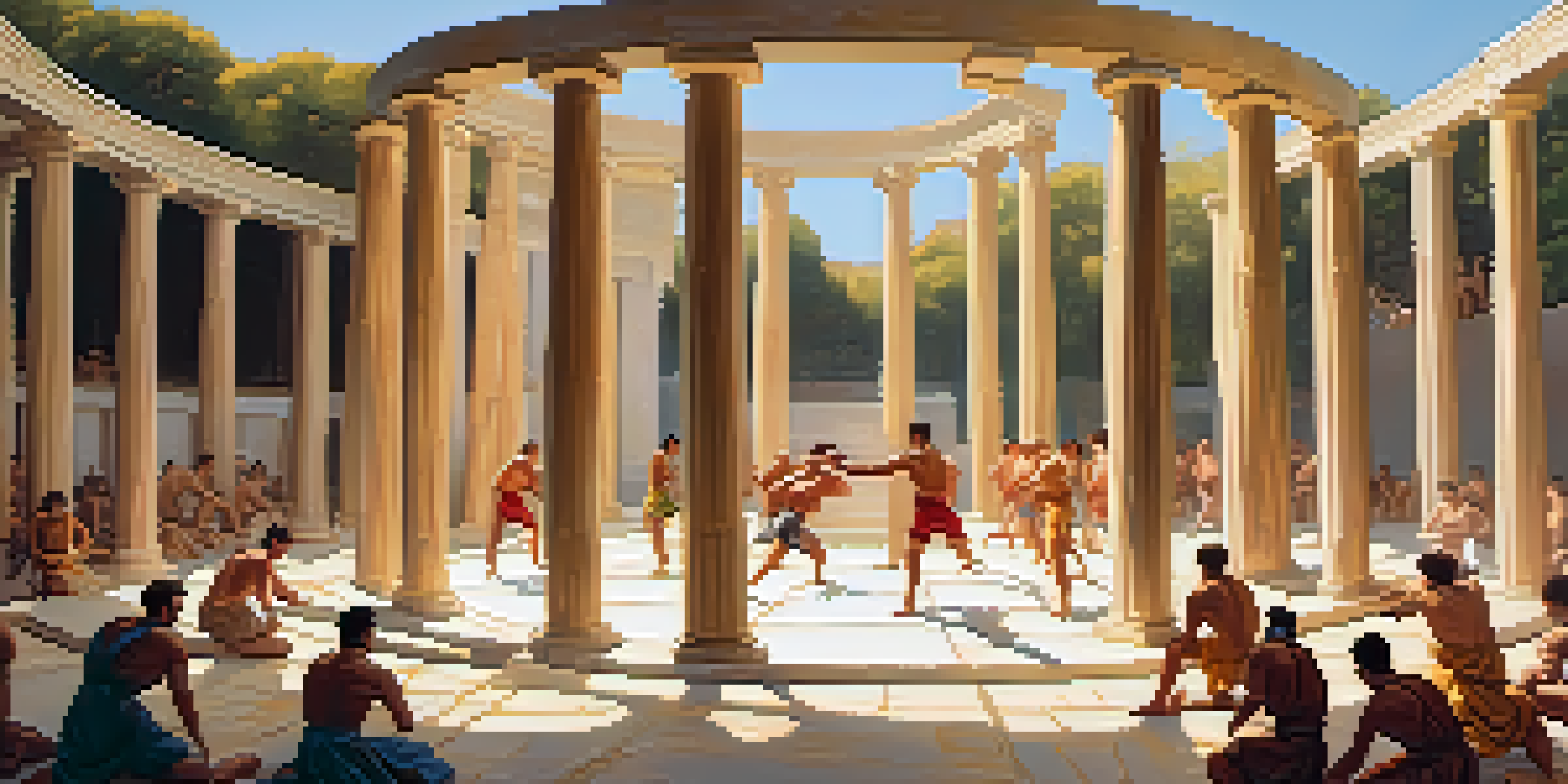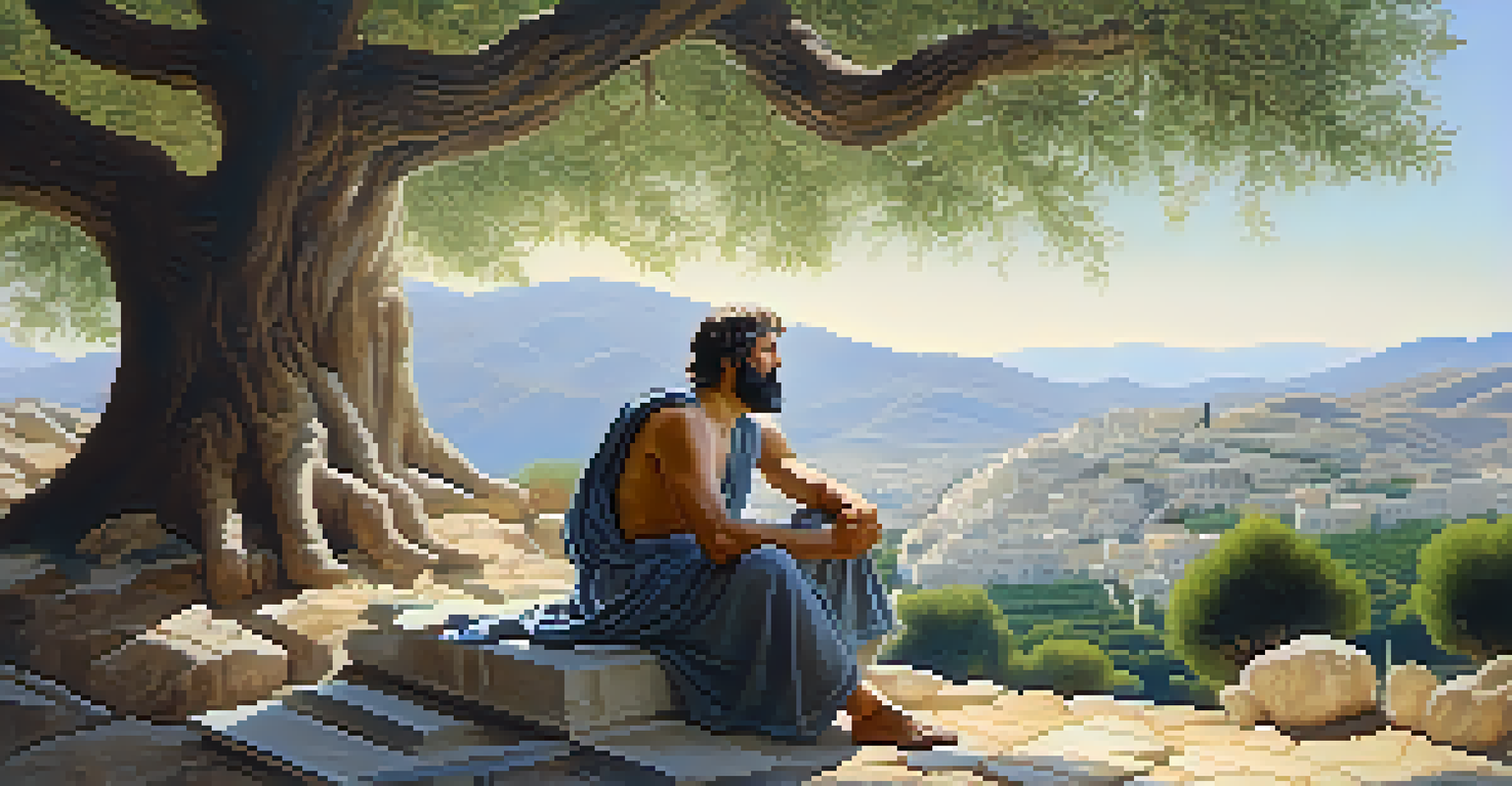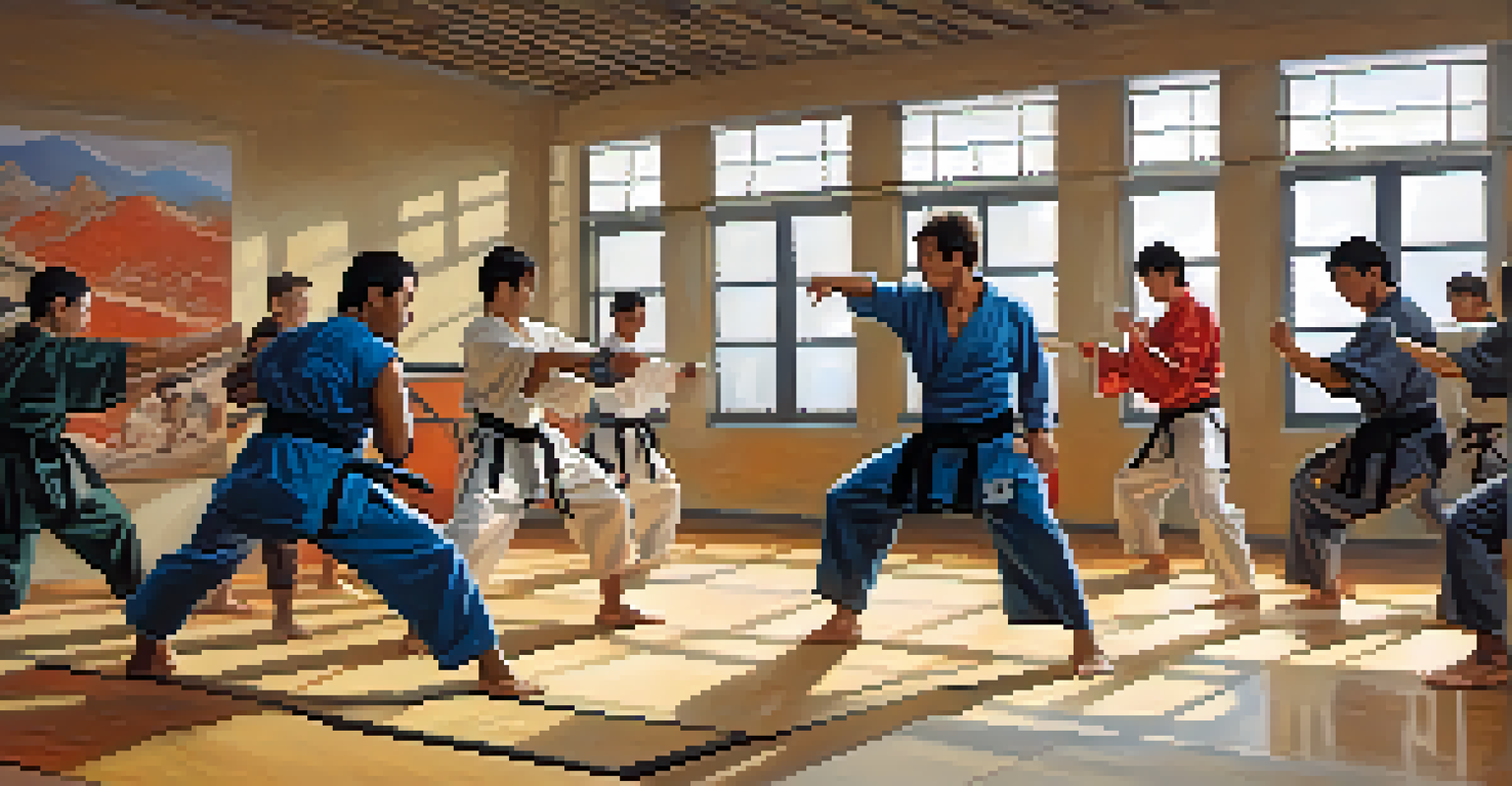The Legacy of Ancient Greek Texts on Modern Martial Arts

The Historical Foundations of Martial Arts in Ancient Greece
Martial arts have a rich history that can be traced back to ancient civilizations, with Greece being a significant player. The Greeks practiced a variety of fighting styles, including Pankration, which combined elements of boxing and wrestling. This blend of techniques laid the groundwork for many modern martial arts disciplines, showcasing the importance of versatility in combat.
The greatest victory is that which requires no battle.
The training methods and philosophies of ancient Greek martial arts were documented in texts by philosophers and athletes alike. Figures like Plato and Aristotle emphasized the importance of physical fitness, discipline, and mental fortitude. These principles continue to resonate in contemporary martial arts training, where the mind-body connection is crucial.
Through competitions like the ancient Olympics, Greeks not only honored martial prowess but also celebrated the spirit of competition and sportsmanship. This tradition is mirrored in today's martial arts tournaments, where respect and honor remain at the forefront of the practice.
Key Texts and Philosophical Influences on Combat Techniques
Several ancient Greek texts, such as the writings of Xenophon and Homer, provide insights into the martial techniques and philosophies of the time. Xenophon’s works often highlighted the importance of strategy and training, which are foundational elements in modern martial arts. Such texts serve as a link between past and present, showing that effective combat requires both physical and mental preparation.

Homer’s epics, particularly 'The Iliad,' depict various forms of combat and heroism, emphasizing the ideals of bravery and skill. The portrayal of heroic figures using martial prowess has inspired countless martial artists today, who look to embody these virtues in their training. This narrative of heroism fosters a deeper connection to the practice of martial arts.
Ancient Greece Shaped Martial Arts
The diverse fighting styles and philosophies from ancient Greece, particularly Pankration, laid the groundwork for modern martial arts.
The philosophical underpinnings of these texts also encourage a holistic approach to martial arts. By studying these ancient writings, modern practitioners gain insights into not just techniques but also ethical considerations and personal development, enriching their martial arts journey.
The Role of Physical Fitness in Ancient Greek Training
Physical fitness was paramount in ancient Greek society, especially for warriors and athletes. Training regimens were rigorous, designed to enhance strength, agility, and endurance. This focus on fitness is echoed in modern martial arts, where conditioning is seen as vital for performance and injury prevention.
What we do in life echoes in eternity.
Athletes would engage in various exercises that mimicked combat scenarios, ensuring they were prepared for any confrontation. Practices like wrestling and running were not just sports; they were essential for developing the skills necessary for martial success. Today, martial arts schools incorporate similar conditioning techniques, highlighting the timelessness of these training methods.
Moreover, the Greeks understood the importance of balance in training, combining physical exertion with rest and recovery. This holistic view is now widely adopted in martial arts, where practitioners learn that mental recovery is just as important as physical training, fostering longevity in their martial arts journey.
Combat Strategy: Lessons from Ancient Greek Warfare
Ancient Greek warfare was characterized by strategic planning and disciplined formations, particularly in battles like those fought by the Spartans. Understanding these strategies can enhance modern martial arts practices, where tactics play a crucial role in sparring and competitions. By studying ancient warfare, martial artists can learn to analyze their opponents and adapt their techniques accordingly.
The concept of the phalanx, a tight infantry formation, teaches the importance of teamwork and cohesion in combat. This principle is mirrored in many martial arts, where practitioners often train in pairs or groups to develop their skills collaboratively. The synergy between fighters can lead to improved performance and deeper learning.
Philosophy and Physical Fitness Unite
The emphasis on physical fitness and mental resilience in ancient Greek training continues to influence contemporary martial arts practices.
Furthermore, the emphasis on adaptability in ancient combat strategies encourages modern martial artists to think on their feet. In unpredictable environments, being able to read an opponent and adjust one’s approach can mean the difference between victory and defeat. This flexibility is a lesson that continues to be relevant in today’s martial arts landscape.
Psychological Resilience from Ancient Greek Philosophy
The psychological aspects of martial arts training can be traced back to ancient Greek philosophies, particularly Stoicism. Stoic philosophers emphasized control over one’s emotions and reactions, which is invaluable in high-pressure situations like martial arts competitions. This mindset helps practitioners maintain focus and composure during sparring or fights.
Moreover, the ancient Greeks believed in the power of self-discipline and perseverance, qualities that are essential for success in martial arts. Training often involves overcoming physical and mental challenges, and the lessons from Greek philosophy remind us that persistence is key. This resilience fosters a deeper commitment to one’s martial arts journey.
By integrating these philosophical teachings into their training, modern martial artists can cultivate a strong mental framework. This not only enhances their performance but also contributes to personal growth, making martial arts a holistic practice that extends beyond physical techniques.
Connection Between Ancient and Modern Martial Arts Schools
Many modern martial arts schools draw direct inspiration from ancient Greek practices, integrating historical techniques with contemporary training methods. For instance, styles like Brazilian Jiu-Jitsu echo the grappling techniques of ancient Pankration, showcasing the enduring nature of these combat arts. This connection highlights the lineage and evolution of martial arts over time.
Moreover, the philosophy of respect and honor cultivated in ancient Greece is deeply embedded in martial arts culture today. Schools often emphasize the importance of etiquette, humility, and respect for instructors, mirroring the values held by ancient Greek warriors. This cultural transmission enriches the experience of practitioners worldwide.
Tradition Connects Past and Present
Modern martial arts schools honor the legacy of ancient Greek practices, integrating historical techniques and values into their training.
By honoring these historical roots, modern martial artists are not just learning techniques; they are participating in a rich tradition that spans centuries. This connection fosters a sense of belonging and purpose, making martial arts more than just a physical activity, but a way of life.
The Future of Martial Arts: Bridging Past and Present
As martial arts continue to evolve, the legacy of ancient Greek texts remains relevant. Modern practitioners can draw lessons from these texts to adapt their training and philosophies to contemporary challenges. By blending ancient wisdom with modern techniques, martial arts can thrive in an ever-changing world.
The ongoing exploration of historical texts ensures that the principles of combat, fitness, and philosophy are not forgotten. This integration of past and present enriches the martial arts community, fostering innovation while honoring tradition. It encourages martial artists to continually seek knowledge and improvement.

Ultimately, the legacy of ancient Greek martial arts serves as a foundation upon which modern practices are built. By recognizing and celebrating these influences, martial artists can cultivate a deeper appreciation for their craft, ensuring that the spirit of ancient Greece lives on in every punch and kick.